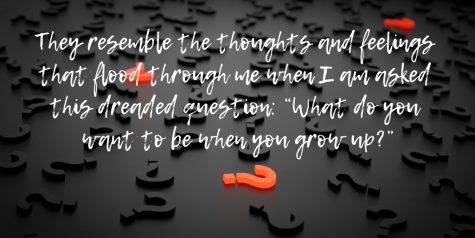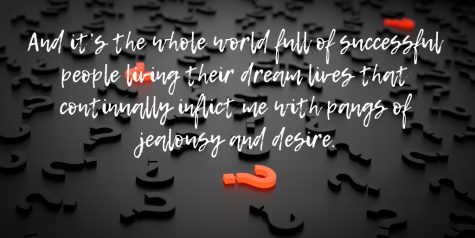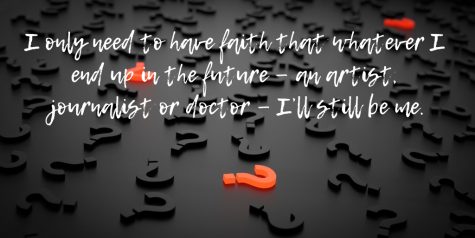Constant Change: As I look toward the future
My struggle with uncertainty about what lies ahead
March 30, 2019
I felt the walls closing in. I placed my palms against them, hoping they would recede, but they only continued to surge ahead. All the thoughts usually swirling around in my brain suddenly dissipated, and I — okay, I’m being a little dramatic. Yet contrary to my usual dramatic tendencies, these walls aren’t momentary metaphors: they represent something. They resemble the thoughts and feelings that flood through me when I am asked this dreaded question: “What do you want to be when you grow up?”

It might seem harmless, but this question has plagued me for eons (okay, I’m feeling a little extra dramatic this month). My first confrontation with this question took place when I was 6 years old. I remember sitting in that classroom with bright blue walls, gazing at the painted butterflies lining their borders, when my first-grade teacher proceeded to ask us about our plans for the future. She didn’t mean any harm, but in retrospect, why did she — like the majority of our society — have this incessant desire to pick and prod at me until I agreed to map out the entirety of my life? In first grade, it didn’t feel so agonizing. In fact, I brushed it off with a casual “I want to run an ice-cream truck.” And while innocent, carefree first graders can formulate a prompt answer, when this question is asked to angsty, uncertain teenagers, responding can feel like trying to bring your grade up by 8% the week before finals.
Lately, after being presented with this question on one too many occasions, these walls around me have gotten uncomfortably close. I’ve felt this pressure to figure out my future, and I’ve felt a sense of impending doom resting in the pit of my stomach. The culprits? Everyone and everything. It’s the students who seem to have their whole life together, for whom course selection is a breeze because they already know their intended major, minor and, just to be safe, back-up major. It’s my parents who will walk into my room every so often and offer unsolicited advice about pursuing a random career while I try to tune them out and focus on my homework (obviously, I’m actually watching Netflix). It’s that career test that we MVHS students are forced to take on Naviance, which tells us to pursue a career in agribusiness. And it’s the whole world full of successful people living their dream lives that continually inflict me with pangs of jealousy and desire.

I’m not trying to say that these influences all horrify me, lower my self-esteem and render me sad and hopeless. I admire the students who have it all figured out, I appreciate my parents’ feedback — despite the lack of interest I tend to display — and I do appreciate Naviance’s career suggestions. It’s just that all these factors seem to be inextricably intertwined, strengthening the foundation of those walls that are slowing inching closer. My frustration stems from the fact that our society is constantly on the lookout for information about my future plan, one that I don’t seem to have — and even if I did, I’m not sure I’d be willing to share it.
Through my experience dealing with my parents, peers and Naviance, my typical coping mechanism for pushing back against these walls has been to blame external factors. I’ve always held fast to the conviction that my rocky relationship with this question is not my fault — but that’s not exactly true.
I wish I could say that I completely changed, that I broke down these walls. I wish I could say that I don’t care about what society thinks anymore, that I’m okay with uncertainty. I wish I could say that I’ve eliminated all these external factors I just mentioned, but as much as I love drama, I would be lying. The only change I’ve gone through is a realization — one that’s perhaps even better than eliminating those bothersome walls. I’ve realized that my dilemma is almost entirely self-inflicted.
I’m relatively good at tuning things out — it explains why I never seem to hear my mom when I’m asked to do anything of any use around the house — so why is it that I choose to listen to the voices in my head, these voices that tell me I’m “behind” because I have yet to figure out my future? I think it’s because I am fearful of the future. I fabricate this pressure and pretend it’s inflicted by other people. I’ve constructed my walls by myself, yet I blame others — tricking myself into thinking that this pressure isn’t self-induced rather than admitting it’s me who wants to fulfill my own craving for reassurance and certainty about my future.

My walls make it difficult for me to explore art without becoming entangled in thoughts of whether or not I should pursue animation as a career. As I write articles for El Estoque, I catch myself every so often wondering whether I’m good enough to someday end up on the byline of a New York Times article. As I try to gauge my interest in biology, I can’t help but diverge into a tangent about whether or not I’ll be able to handle the emotional toll of one day being a doctor. It’s a self-fulfilling prophecy: I create broad implications and have a tendency to overcomplicate everything, which sometimes detracts from the joy I receive from doing these things. My walls are becoming increasingly problematic, but perhaps I can try to chip away at them, and eventually break them down. This question doesn’t have to take over my life — I won’t let it. I only need to have faith that whatever I end up in the future — an artist, journalist or doctor — I’ll still be me. And there are no walls in the world that will stop me.

















